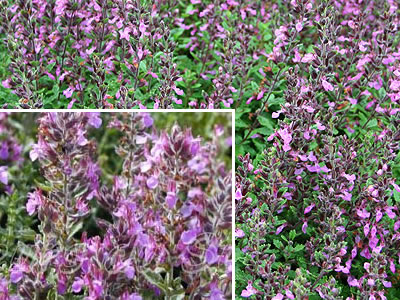Germander is said to help weight loss, digestion, gout and wounds. But you should use it with caution due to the safety concerns.
Germander (Teucrium chamaedrys) is a perennial plant in the family Lamiaceae. It is native to Mediterranean area. Germander has been used for centuries in Europe as a herbal medicine. A decoction of germander was a cure for gout, rheumatism, asthmatic conditions and coughs. Germander was used as a tonic for reducing fevers and treating uterine obstructions. It was also used to improve digestion and increase appetite.
Traditionally, germander infusion is said to treat or relieve the following disorders: stomach pain, diarrhea, spasms in intestines, internal hemorrhoids, internal disinfection, gout, rheumatism, cough, fever, etc. Germander is anti-inflammatory, antirheumatic, aromatic, astringent, carminativo, digestive, and stimulating. It is also said to help lowering blood glucose levels. Today, people still use germander for treating fever, stomachaches and diarrhea. It is still being used as a digestive aid, and for weight loss.
The leaves of the germander is used as a spice for cooking. In manufacturing, germander is used as a flavoring in alcoholic beverages.
Germander is said to be unsafe. Long term Germander use may cause liver damage – hepatitis. In the 1980s, germander was a popular treatment for weight control in France. But later, according to a study published on Ann Intern Med. 1992 Jul 15;117(2):129-32, the researchers in Liver units of several centers in the French Network of Pharmacovigilance conducted a study and found that, 7 patients who developed hepatitis after used germander and who had no other cause of liver injury. The study shown that hepatitis characterized by jaundice and a marked increase in serum aminotransferase levels occurred three to eighteen weeks after germander use. Liver biopsy specimens in 3 patients showed hepatocyte necrosis. After stopped germander use, jaundice disappeared within eight weeks and recovery was complete in a few months. In 3 cases, germander readministration was followed by the prompt recurrence of hepatitis. The researchers concluded that: Germander may be hepatotoxic.
In Europe, France has banned Germander from sale. In North America, Canada does not allow germander for internal use. But the US still allows small amounts of germander to be used as a flavoring ingredient in alcoholic beverages.
Traditional preparation – how to use germander
Germander Infusion:
– Dried germander root powder 1 teaspoon
– Boiling water 1 cup
– Steep for 15 minutes
– This remedy is said to be effective for relieving stomach pain, gout, fever and coughs
The infusion can be used externally as a mouthwash for treating gum sore and mouth ulcers, or used to wash wounds. Germander has anti-inflammatory properties.
Germander Oil:
– Dried germander root powder 3 teaspoons
– Dried marigold leaves 2 teaspoons
– Olive oil 1 cup
– Soak the powder and leaves in the oil
– Leave for 4 weeks
– Apply to the skin to heal wounds
Due to the safety concerns, it is suggested that germander should not be used for internal treatment. It is necessary to consult your doctor before taking germander as a remedy for your treatment, especially for weight loss.
Read more information about natural remedies for weight loss.



